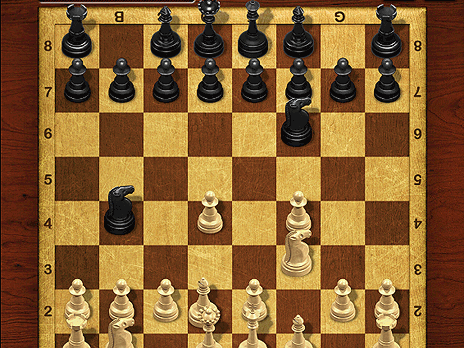Classic Games
Master Chess Game Review – Elevate Your Chess Experience with Strategy and Precision
In the ever-evolving world of digital gaming, “Master Chess” emerges as a beacon for chess enthusiasts seeking a blend of traditional gameplay and innovative features. Developed by [Developer Name], this game transcends the boundaries of conventional chess, offering a captivating digital rendition that caters to both casual players and seasoned tacticians. In this extensive review, we will delve into the gameplay mechanics, provide a step-by-step guide on how to play Master Chess, and explore advanced strategies to hone your skills and dominate the virtual chessboard.
Gameplay Overview:
Master Chess encapsulates the timeless allure of chess within a digital realm. The game boasts a user-friendly interface, stunning graphics, and a plethora of features that cater to players of all skill levels. Whether you’re a novice looking to learn the basics or a seasoned grandmaster seeking a challenging opponent, Master Chess delivers an immersive and engaging experience.

How to Play Master Chess:
Master Chess, a digital incarnation of the timeless game of strategy and intellect, invites players into a captivating world where each move shapes the course of the battle. In this comprehensive guide, we will explore the intricacies of playing Master Chess, offering a step-by-step walkthrough for both beginners and seasoned players. From the basics of piece movement to advanced strategies that can tilt the scales in your favor, let’s delve into the nuances of mastering the virtual chessboard.
1. Navigating the Interface: Master Chess welcomes players with an intuitive interface designed for easy navigation.
- Menu Navigation: Familiarize yourself with the menu options, including Single Player, Multiplayer, Tutorials, and Lessons.
- Settings: Customize the game settings according to your preferences, adjusting features such as board style, piece design, and sound settings.
2. Understanding Piece Movement: Before diving into strategic intricacies, grasp the fundamentals of how each chess piece moves.
- Pawn: Moves forward but captures diagonally. On its first move, a pawn can advance two squares.
- Rook: Moves horizontally or vertically across the board.
- Knight: Moves in an “L” shape – two squares in one direction and one square perpendicular.
- Bishop: Moves diagonally across the board.
- Queen: Combines the movements of the rook and bishop.
- King: Moves one square in any direction.
3. Game Modes: Master Chess offers various game modes to cater to different preferences and skill levels.
- Single Player: Practice against AI opponents with adjustable difficulty levels. This mode is ideal for refining your skills and experimenting with strategies.
- Multiplayer: Engage in real-time battles against friends or players worldwide. Test your strategic prowess in a competitive setting.
4. Tutorials and Lessons: For those seeking to deepen their understanding of chess strategies, Master Chess provides valuable tutorials and lessons.
- Basic Lessons: Cover the essentials, including piece movement, check, checkmate, and stalemate.
- Advanced Strategies: Explore tutorials on opening strategies, mid-game tactics, and endgame mastery.
- Practice Exercises: Hone your skills through interactive exercises that reinforce key concepts.
5. Opening Strategies: Mastering chess begins with understanding various opening strategies and their implications.
- Control the Center: Aim to control the central squares of the board. This establishes a strong foundation for future moves.
- Develop Pieces: Prioritize developing your knights and bishops early in the game. Avoid moving the same piece multiple times in the opening unless necessary.
6. Mid-Game Tactics: As the game progresses, shift your focus to mid-game tactics.
- King Safety: Ensure the safety of your king by castling early in the game. This move both protects your king and brings the rook into play.
- Piece Coordination: Coordinate the movements of your pieces to control key squares and create threats.
- Pawn Structure: Be mindful of your pawn structure. Avoid creating weaknesses that opponents can exploit.
7. Endgame Mastery: The endgame often separates the skilled players from the novices. Hone your endgame skills with these principles.
- King Activity: Activate your king by bringing it toward the center. A centralized king becomes a powerful asset in the endgame.
- Pawn Promotion: Understand the mechanics of pawn promotion and leverage it to gain a material advantage.
8. Clock Management in Multiplayer: In multiplayer matches, effective time management is crucial for success.
- Time Awareness: Keep an eye on the clock to avoid time pressure. Balance thoughtful moves with the need to make decisions promptly.
- Prioritize Moves: Focus on critical moves that advance your strategic objectives. Avoid unnecessary delays that can drain your clock.
9. Learning from Mistakes: Every game provides an opportunity for growth. Analyze your moves, especially in defeats, to continually improve.
- Post-Game Analysis: Review your games to identify mistakes and missed opportunities. Use the analysis to refine your strategies.
- Seek Feedback: Engage with the chess community, seek feedback on your games, and learn from more experienced players.
Advanced Strategies for Master Chess:
To truly master Master Chess, aspiring players should delve into advanced strategies that go beyond the basic rules of chess.
-
Opening Strategies:
- Familiarize yourself with various opening moves and understand their implications.
- Experiment with different openings to keep opponents guessing and to adapt to various playstyles.
-
Mid-Game Tactics:
- Develop a keen sense of board awareness during the mid-game.
- Focus on controlling the center of the board, coordinating your pieces, and setting the stage for a powerful endgame.
-
Endgame Mastery:
- Hone your endgame skills, as this phase often separates the novice from the expert.
- Learn key endgame patterns, such as king and pawn endings or opposition, to secure victories in tight situations.
-
Strategic Sacrifices:
- Understand the art of sacrificing pieces for positional advantages or to create openings.
- Master Chess provides a platform to experiment with strategic sacrifices and assess their impact on the overall game.
-
Clock Management in Multiplayer:
- In multiplayer matches, time management is crucial. Practice efficient decision-making to make the most of your allotted time.
- Balance between making strategic moves and keeping an eye on the clock to avoid time pressure.
-
Adaptability and Learning from Mistakes:
- Analyze your games, especially losses, to identify weaknesses and areas for improvement.
- Embrace a growth mindset, adapting your strategies based on lessons learned from each game.
Conclusion:
Master Chess stands as a testament to the enduring legacy of chess, seamlessly merging tradition with innovation. Its intuitive interface, diverse game modes, and educational features make it an ideal platform for players to refine their skills and engage in intellectually stimulating battles. Whether you’re a casual player seeking a relaxing game or a dedicated chess enthusiast aiming for mastery, Master Chess provides an immersive and challenging experience.
Download Master Chess today to embark on a journey of strategic brilliance, where each move shapes the destiny of the game. With its blend of accessibility and depth, Master Chess is not just a game; it’s a digital battleground where minds collide and strategic genius prevails. Immerse yourself in the world of Master Chess, where every move counts, and victory awaits those who can truly master the art of chess.

